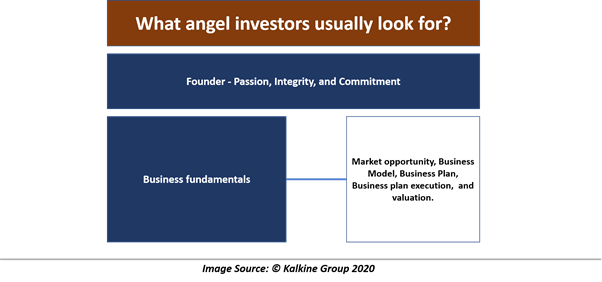Angel Investor
Updated on 2023-08-29T11:59:55.428201Z
Angel investor is an individual who invests in a company of his/her interest, often with their own money. This is a seed capital round, and the investor gets stake in the company in return. Angel investment is the very first round of funding which helps businesses get off the ground. Angel funding plays a significant role in helping the businesses navigate the challenges during early stage.
Angel investors find these companies through their strong network, referrals, angel investor groups, contacts, conferences etc. They usually look for 20-25 percent of holding in a company.
Read: Things you might want to know about Angel Investing
Angel investors are usually HNIs (high net worth individuals), retired business executives, or entrepreneurs. They are also called seed investors, private investors or angel funders. Beside investment, angel investors also provide mentorship to the entrepreneurs. Most of these investors are entrepreneurs’ friends and family members.
How did the term “Angel” originate?
The term Angel came from Broadway shows which were funded by wealthy individuals as these shows were on the verge of shutting down due to the lack of funding. Therefore, these investors were called angels.
Often, there is no guaranteed return on these investments, but when a start-up becomes successful, it can fetch massive returns.
Angel investors are the highest risk takers. Since every business needs funding and it is difficult to raise money when it is too young, the sources of funding are narrow. In such scenarios, angel investors take the risk and invest their money in exchange of ownership.
Often, angel investors have objectives beyond just monetary return. So, the angel investors provide connections, mentorship, and advice to the budding entrepreneurs.
Angels also come together and form a group to invest in a company of same interest. These groups come to the rescue of needy and deserving companies, which need funding. The group of investors goes through all the opportunities available and does a proper due diligence before investing.
Some angel investors are interested to invest in societal causes like innovation, research, and social upliftment. Mostly, they invest in such businesses which have positive impact on society through products or services.
New research and innovations are the key to structural changes in society and angel investors support such ideas for business and economies.
What angel investors usually look for?
Undoubtedly, money does not come easily. Founders who receive capital, have to dilute their holdings in their companies.
When an investor invests in a company, they look for lots of things before investing.

First of all, angels look for passion, integrity, and commitment of the founders towards their business. Competence of management was followed by evaluating business strength such as market opportunity, business model, business plan, evidence of progress towards a business plan, and valuation.
Other than that, intellectual property and innovation also remain crucial factors in dictating terms with investors. A business with strong and scalable intellectual property backed by solid innovation always attracts investors.
It is not easy to find an angel for founders for their company. Usually, angel investors invest in such companies which fall in their circle of competence. It can take lot of time for capital raising.
Before investing, angel investors see many factors in a startup. Some of these include the unit economics of the business, cash burn rate, financial projections of future, amount of capital sought, application of funds, potential margins etc.
Founders should also have a future plan in hand for their business like how they would scale the business, how they would approach the market for their products and services, customer acquisition strategy, advertising and social media strategy.
Angel investing vs venture capital vs private equity
Angel investment
Angel investment is a smaller round of funding than venture capital and private equity. Sometimes Venture Capitalists also invest in an angel round of a startup but it is very uncommon that angel investors are taking part in venture capital round of funding.
Angels invest in a company which is yet to hit the ground and is in its pre-revenue stage. Although venture capital is also a popular source of financing, however the venture capitalists tend to invest in businesses having a proven revenue model, customers and products.
While an angel investment can be of a small amount, investors sometimes just look for ideas to invest in. Venture capitalists only invest in companies that have a proven revenue stream as they invest bigger amounts of money, which runs in millions.
Comparatively, private equity investment round is the biggest round of funding in a company’s fundraising cycle. Companies get PE investors only when a business has proven revenue streams, products, cash flows, as well as profitable margins.
PE investors typically do takeover of the company. As this is the last round of fundraising by a company, the investors only invest where they analyse that more value can be added in a business after taking it over. The deal size typically goes in billions in PE investments.
Angel investors typically use their own money.
Venture capital (VC) funding
VC firms evaluates a company on the basis of market share, revenue margins, cash flows, growth opportunities, leadership team, etc, while Angel investors typically focus on founders, market opportunity and basic fundamentals of the investments.
VC firms pool in money from other investors and invests through a strategically managed fund.
Private equity (PE) funding
PE firms invest in companies that have already shown traction in the market and have concrete financials supporting their business strength. Their financial due diligence covers business fundamentals.